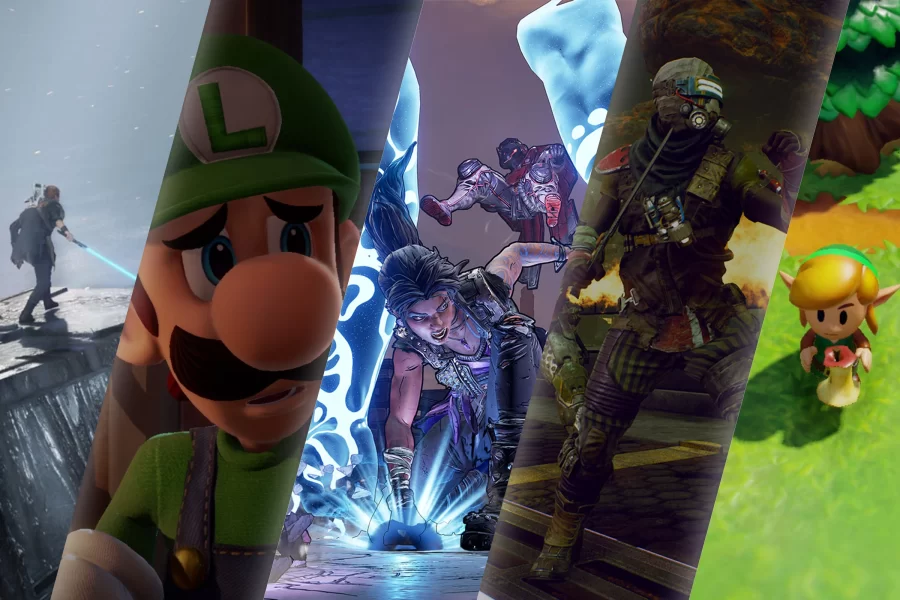Video Games and the Fundamentals of Life
April 18, 2022
Too many times, parents have vitriolically ridiculed their children for playing video games. This can be chalked up to the natural human response to blame/fear the unknown. Because of the generational gap, specifically between Boomers and Zoomers (Gen Z, which is becoming increasingly more appropriate due to COVID and video calling), the generationally novel and rapid development of video games has been made a scapegoat for all negative behavior. Common phrases include, but are not limited to, “it’s because you play too many video games” and “video games won’t help you get a job.” Ironically, video games, as I understand them, are utilitarian resources for life skills that will not only help individuals land jobs but thrive in whatever field they go into.
While I will spend most of this article discussing the life skills derived from video games, the possibility of making a living off video games is not out of the question. In fact, thousands of people have made millions of dollars by playing video games either recreationally or professionally. For example, top gamers on Youtube, such as Markiplier, have been playing video games for over a decade, and, from the ad revenue generated by hundreds of millions of views, have made as much as some professional athletes. “In 2018, he earned $17.5 million dollars, which was enough to make him the sixth highest-paid YouTube star in the world” (Wallin). Limitations exist for this lifestyle, however. Firstly, amassing enough followers to make a living takes a lot of time, as well as trial and error. Also, personality and sense of humor play a large role in what makes a YouTuber entertaining, especially if he/she is not aiming to be proficient at said game. Therefore, making a lot of money by playing video games recreationally is limited to a small selection of individuals. The other vector in which video games directly generate revenue is by becoming a professional in a certain game. These competitive games are always PvP-based (player vs player): Rainbow Six Siege, Valorant, Rocket League, Fortnite, etc. Of course, the commitment required to maintain peak skill in these games mimics the timeframe of a typical 9-5 job. Again, the amount of people able to access these lifestyles is minuscule. Therefore, it is much more logical to discuss the applicable skills learned through video games.
Like books, video games have dozens of different genres combined with thousands of themes and playstyles. Out of all the video games on the market today, I believe that the most enriching is sandbox survival craft games (SSCGs). These games are characterized by their limitless borders and structure. In other words, there is no story nor missions that follow a timeline. The only objective is to survive. Games that fall into this category include, but are not limited to, Minecraft, Rust, the Forest, Subnautica, etc. Like all games, you respawn when you die, but at the cost of losing your inventory, which is, typically, filled with hard-earned items. This penalty gives more meaning to each life in a video game. This leads to the first skill that is derived from games: risk-taking and assessment. This is mainly because each time a player intends to go out exploring with their best items, they must first assess whether venturing into the sheer unknown is worth the risk of losing valuable items. This risk is complicated if the game has other players in it, for their goal is, also, to survive, which is typically done by eliminating other players. This forces players who assess the risk of venturing with items to consider enemy players as one of their biggest, yet most ambiguous risks, for the whereabouts of enemy players are seldom known.
After assessing the risk, a player may decide to venture into the world. Depending on the game, a varying amount of strategy is required in order for the player to succeed. While this varies by game, each one teaches the player to use strategy as well as quick thinking to proceed further in the game. For example, in the Assassin Creed games, the player is purposely underequipped compared to enemies. This forces players to strategize when they plan to infiltrate a fortress. However, when strategy fails, this is where quick thinking comes into play. In video games, quick thinking requires knowledge of the character’s abilities as well as the abilities of the enemy and reacting accordingly. For instance, an enemy could have an item or an attack pattern that was not accounted for. A mediocre player would push forward with the same strategy that may be faulty against this unexpected circumstance. An adept player would adapt and change his/her strategy to achieve victory in the most efficient method. Again, these two skills relate to the real world. All successful people have plans: plans for college, career paths, family plans, etc. Also, strategy in video games gives players the opportunity to think outside the box, which echoes the effect of Dungeons and Dragons. Like games, strategies are not always impervious to failure. Things happen that are out of our control, which forces us to improvise. In reality, the skill of quick thinking in video games conditions people to be cool under pressure and when life goes south. Other real implications of these skills involve problem-solving through trying the unorthodox approach, combining the skills of risk-taking, strategy, and improvisation.
Sometimes, though, even improvising does not do the trick to achieve victory. More often than not, a player’s level is simply too low, or the strategy required requires more physical perfection (by the user). In almost all SSCGs, dying means losing the inventory. In retrospect, video game items, like everything in any game, are fake, a series of zeros and ones in code. However, the time spent to procure these items is, still, very real. This relates to the saying that “time is money;” just substitute money for items and the concepts align. For example, a player spending six hours trying to get a rare item is analogous to a worker who spends six hours to earn a certain amount of money. Like several instances in math, the concept is the same, but the variables have different definitions. This is why gamers, when faced with a death screen, are crushed; all the time they spent gathering and meticulously grinding for an excellent set of gear was for nothing. They are gone for good. This leads to the most important skill a video game could teach: tenacity. In my opinion, a person does not necessarily need to have any natural talent to become successful (though it helps) so long as they have tenacity. Deaths in video games simulate the feeling of failure well. Like real life, video games refuse to turn back the clock for the player, forcing them to start back from square one.
Getting Over it with Bennett Foddy is a simple arcade game that revolves around assiduousness. The objective of the game is simple: to climb a mountain. This task is easier said than done. From personal experience, the controls to this game are unwieldy at best. When searched on YouTube, countless gamers are featured throwing various objects in rage due to their crushing defeats. One of the reasons why this game, in particular, is brutal is because, even when a player is nearly at the top of the mountain (and thus at the end of the game), there is always a potential for losing it all and starting at the very bottom of the mountain. Funny enough, the bottom of the mountain is made of stone which gives the term “rock bottom” a double entendre. Markiplier’s playthrough of this game is the epitome of tenacity. He failed time and time again, raged countless times, breaking a chair in the process, but he persevered. He forced himself to continue on, passing stages of the mountain he passed hundreds of times, until finally reaching the top. To make matters worse, Foddy programmed mocking songs to play each time the player fell down, adding insult to injury. This game is symbolic of life and teaches players to cope with failure and venture forth anyway. In my eyes, that is the hallmark of human existence: to spit in the face of failure and become victorious. This concept applies to any lens or idea in life. For example, some of the most famous Catholic saints were also the most sinful, and it was from this sin, or failure to abide by God’s rules, that began their journey to become revered by the Church. All people face adversity: athletes, entrepreneurs, lawyers, government officials, and many more. The greatest and most awe-inspiring success stories and comeback stories start from failure. While, in the grand scheme of things, video games have little to no impact in life, they serve as educational simulations of life. Some video games even simulate team dynamics identical to those of professional team sports such as basketball, baseball, and football. Competitive Rainbow Six Siege teams consist of a 5-man squad. Each person understands their individual role and how they fit into their team. Each player has the same goal in mind as well. Sound familiar? This is the exact format of every functional team and organization ever to exist. To make team-based video games even more realistic, almost all of them require skills as well as experience, therefore practice becomes a viable prospect, much like a traditional sports team.
Other, more minor, skills can be contrived from video games such as reflexes and hand-eye coordination, but they dwarf in importance when compared to the life skills discussed. It is also important to mention the idea of moderation. While video games serve as engaging vectors of seemingly subconscious education, it is important to apply these concepts to real-life situations to fully enrich the person. By no means, is cathexis on video games healthy; in fact, it is condemnable. However, it is naive to think that video games have no place in society. In reality, simulations can teach people far more than other recreational activities could. Today, video games have become increasingly more technical as virtual reality is seen in more and more places. It is only a matter of time before the concept of a full dive virtual world, as depicted by Ready Player One and Sword Art: Online becomes a reality in which people can live their lives in a game. Once that happens, real life would turn into an arena and the full dive world would be the training ground for not only life skills but life in general.

